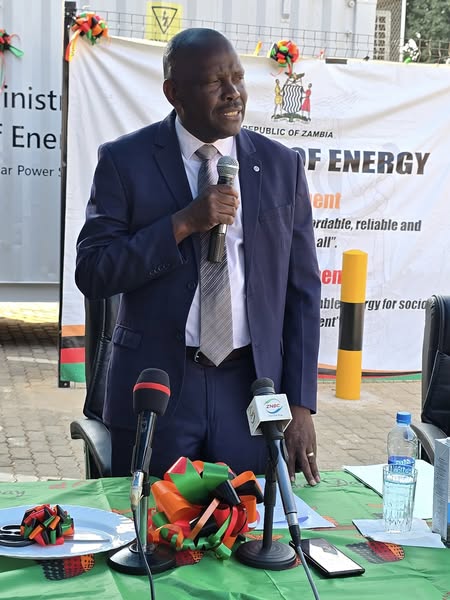Ministry of Energy Commissions Rooftop Solar System to Lead Zambia’s Clean Energy Transition
Zambia’s Ministry of Energy has taken a major leap toward sustainable power solutions by commissioning a 121.8kW rooftop solar photovoltaic (PV) system with 125kWh battery storage at its Lusaka headquarters.
The project is part of the Presidential Solar Initiative, launched in response to the 2024 drought crisis that severely impacted hydropower generation nationwide.
Commissioning the project, Minister of Energy Makozo Chikote hailed the system as a model for clean energy adoption across public institutions. “This rooftop solar PV system is a demonstration of our Ministry’s commitment to lead by example,” said Mr. Chikote. “It is not just a technical installation—it is a statement of national competence.”
The K6.8 million project was executed entirely by Zambian professionals, underscoring the country’s growing capacity to deliver local, innovative energy solutions. The solar system now powers the Ministry’s operations 24/7 and is equipped with net-metering capabilities that allow excess power to be sent to the national grid, making ZESCO a backup source rather than the primary supply.
The Ministry previously relied on diesel generators, spending up to K68,000 per month on fuel. The shift to solar is expected to cut operational costs while supporting Zambia’s transition to a more climate-resilient energy system.
Permanent Secretary for Electricity, Eng. Arnold Simwaba, reiterated the Ministry’s role as an implementation leader. “We are not just policymakers—we are implementers. This installation is living proof of our resolve to walk the talk and lead the clean energy transition,” he stated.
The move aligns with Cabinet Office Circular No. 13 of 2024, which directed all government institutions to install rooftop solar systems to reduce pressure on hydropower and improve national energy resilience.
Minister Chikote urged other public institutions to follow suit by engaging the Ministry for technical guidance. “This system is a model for replication,” he said. “Adopting renewable energy is no longer optional—it’s essential for energy security.”



